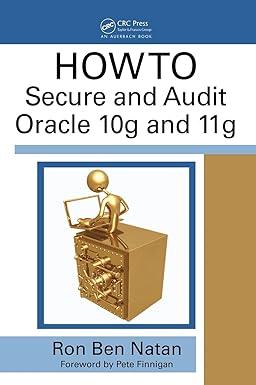Starfax, Inc., manufactures a small part that is widely used in various electronic products such as home computers. Operating results for the first three years
Starfax, Inc., manufactures a small part that is widely used in various electronic products such as home computers. Operating results for the first three years of activity were as follows (absorption costing basis):
Sales $ 1,250,000 $ 1,000,000 $ 1,250,000 Cost of goods sold 880,000 620,000 932,500 Gross margin 370,000 380,000 317,500 Selling and administrative expenses 330,000 280,000 330,000 Net operating income (loss) $ 40,000 $ 100,000 $ (12,500)
In the latter part of Year 2, a competitor went out of business and in the process dumped a large number of units on the market. As a result, Starfaxs Sales dropped by 20% during Year 2 even though production increased during the year. Management had expected sales to remain constant at 50,000 units; the increased production was designed to provide the company with a buffer of protection against unexpected spurts in demand. By the start of Year 3, management could see that inventory was excessive and that spurts in demand were unlikely. To reduce the excessive inventories, Starfax cut back production during Year 3, as shown below:
Year 1 Year 2 Year 3 Production in units 50,000 60,000 40,000 Sales in units 50,000 40,000 50,000
| Additional information about the company follows: |
| a. | The companys plant is highly automated. Variable manufacturing expenses (direct materials, direct labor, and variable manufacturing overhead) total only $5.00 per unit, and fixed manufacturing overhead expenses total $630,000 per year. |
| b. | Fixed manufacturing overhead costs are applied to units of product on the basis of each years production. That is, a new fixed manufacturing overhead rate is computed each year. |
| c. | Variable selling and administrative expenses were $5 per unit sold in each year. Fixed selling and administrative expenses totaled $80,000 per year. |
| d. | The company uses a FIFO inventory flow assumption |
| Starfaxs management cant understand why profits doubled during Year 2 when sales dropped by 20%, and why a loss was incurred during Year 3 when sales recovered to previous levels.
|
Reconcile the variable costing and absorption costing net operating income for each year.
Reconciliation of Variable Costing and Absorption Costing Net Operating Incomes Year 1 Year 2 Year 3 a.Variable costing net operating income (loss) b.Add (Deduct) fixed manufacturing overhead cost deferred in
(released from) Year 2 and released in year 3
c.Add (Deduct) fixed manufacturing overhead cost deferred in
(released from) inventory from Year 3 to the future under absorption costing
d.Absorption costing net operating income (loss)
| If Lean Production had been used during Year 2 and Year 3 and the predetermined overhead rate is based on 50,000 units per year, what would the companys net operating income (or loss) have been in each year under absorption costing? (Losses should be indicated by a minus sign.)
|
Step by Step Solution
There are 3 Steps involved in it
Step: 1

See step-by-step solutions with expert insights and AI powered tools for academic success
Step: 2

Step: 3

Ace Your Homework with AI
Get the answers you need in no time with our AI-driven, step-by-step assistance
Get Started


